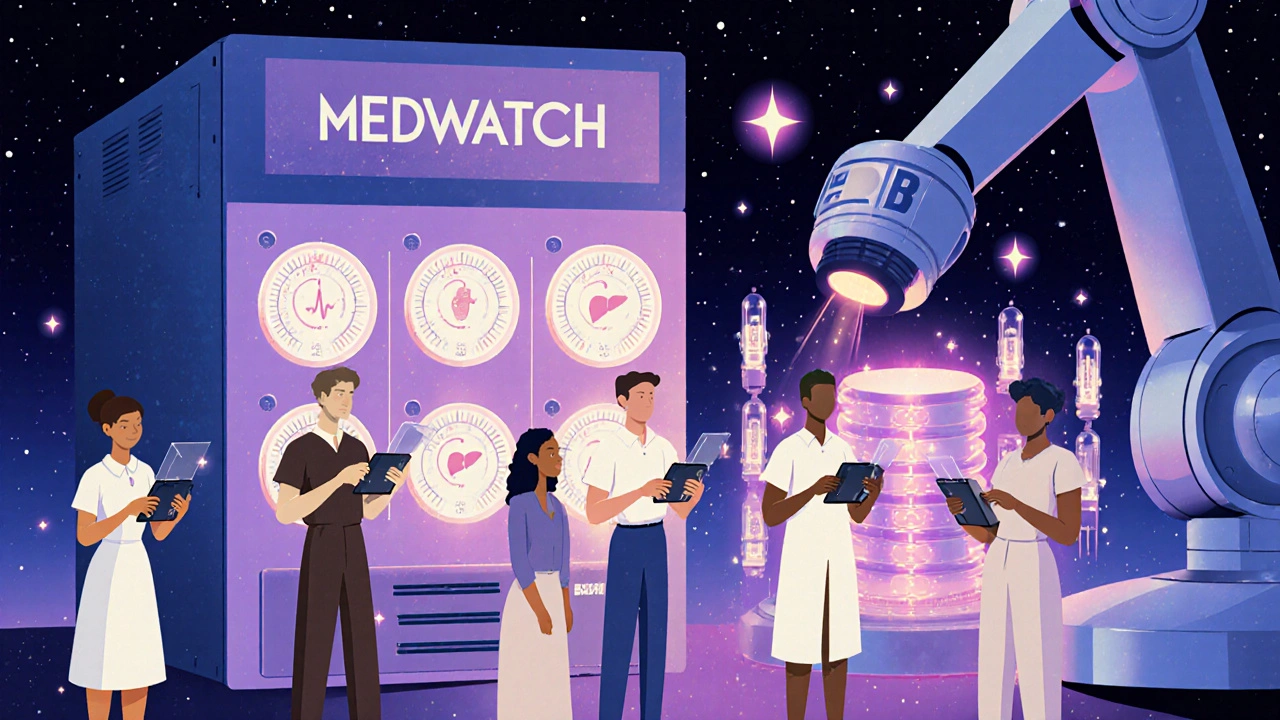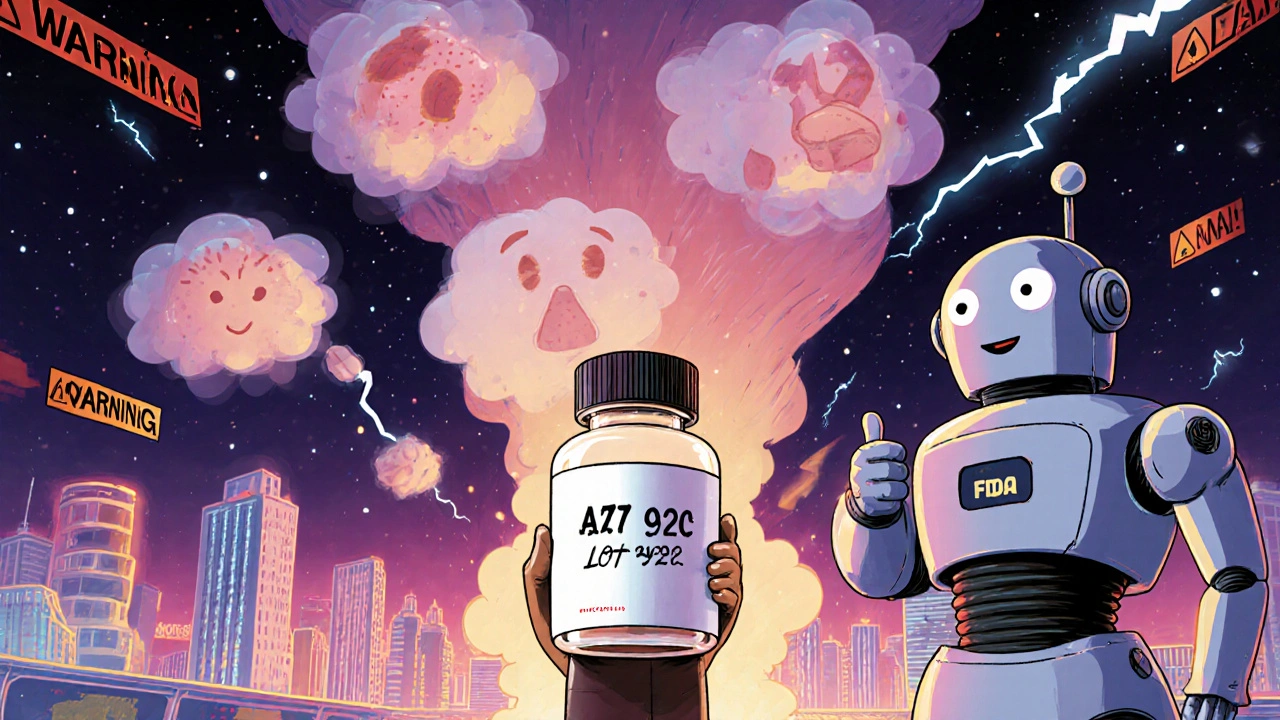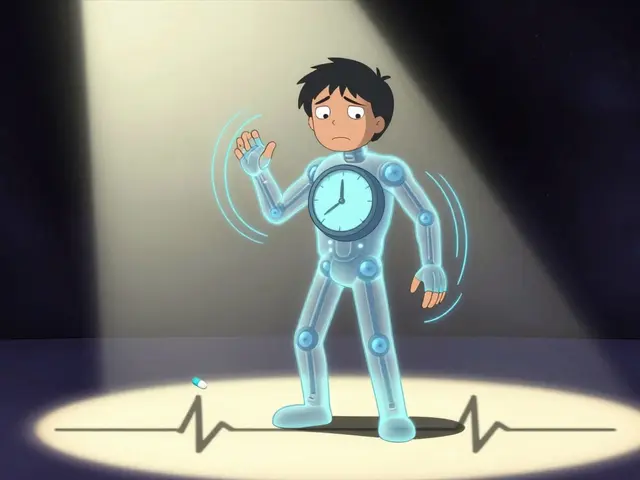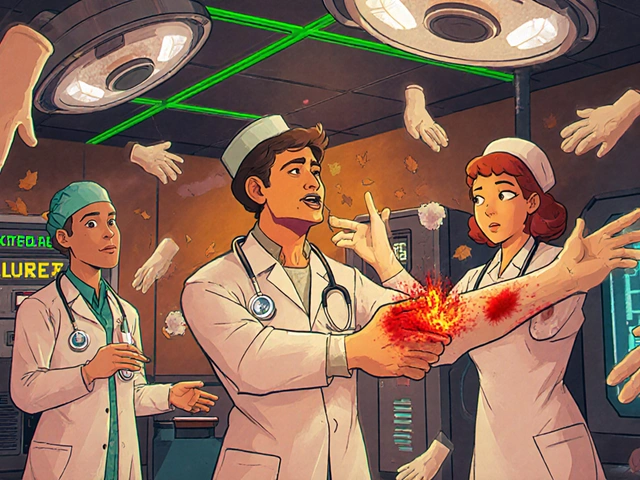Many people assume that generic medications are less safe than brand-name drugs. That’s not true. The active ingredient in a generic is identical to the brand version. So why do rare side effects still happen? And more importantly - when should you report them?
Why rare side effects happen with generics
Generics work the same way as brand-name drugs. They contain the same active ingredient, in the same strength, and are meant to do the same job. But they’re not always made the same way. The inactive ingredients - things like fillers, dyes, or preservatives - can differ. For most people, this doesn’t matter. But for some, even a tiny change in these ingredients can trigger a reaction.
Take lactose, for example. It’s a common filler in pills. If you’re lactose intolerant, a generic version of your medication might contain it - while the brand version doesn’t. That small difference could cause bloating, diarrhea, or worse. It’s not the drug failing. It’s the delivery system.
Another issue is timing. Some rare side effects only show up after months or years of use. Clinical trials involve thousands of people, but they can’t catch everything. When millions start taking a generic drug, patterns emerge that weren’t visible before. That’s how we learned about QT prolongation with certain generic citalopram pills - a heart rhythm issue that showed up in 17 separate reports before the FDA updated the label.
What counts as a rare adverse event
The FDA defines a rare adverse event as something that happens in fewer than 1 in 1,000 people. But sometimes, it’s even rarer - 1 in 10,000 or less. These are the events that slip through clinical trials and only show up once a drug is widely used.
Examples include:
- Stevens-Johnson Syndrome after taking generic lamotrigine (a seizure drug)
- Severe liver damage after starting a generic statin
- Angioedema (swelling of the face or throat) from an ACE inhibitor generic
- Unexplained joint pain with generic levetiracetam
These aren’t common. But when they happen, they can be life-threatening. The key isn’t whether the reaction is common - it’s whether it’s unexpected and serious.
When you must report a side effect
You don’t need to wait for proof. If you suspect a generic drug caused a strange or serious reaction, report it - even if you’re not sure.
Here’s when to act:
- The reaction is serious. That means it caused hospitalization, disability, birth defects, or could have killed you. Even if you recovered, report it.
- The reaction wasn’t listed in the patient leaflet. If your doctor didn’t warn you about it, and it’s not in the official prescribing information, it’s unexpected. That triggers urgent reporting.
- The timing makes sense. Did the symptom start within days or weeks of switching to the generic? That’s a red flag. For example, liver injury from statins usually shows up 1-6 weeks after starting.
- No other cause fits. If you didn’t start any new supplements, change your diet, or get sick with something else - the drug is the most likely culprit.
Don’t wait for others to report it. Your report could be the one that saves someone else’s life.

How to report: The simple 5-step process
Reporting is easier than you think. The FDA’s MedWatch system is built for this. Here’s how to do it right:
- Write down the details. Date you started the generic. What you were taking before. What symptoms you had. How long they lasted. Did you stop the drug? Did symptoms get better?
- Include the lot number. This is critical. Look on the pill bottle. It’s usually a mix of letters and numbers. Without it, regulators can’t trace if it’s a bad batch or a class-wide issue.
- List all other meds and supplements. Even if you think they’re unrelated. A reaction might be caused by a mix of drugs - not just the generic.
- Choose the right form. If you’re a healthcare provider, use Form 3500. If you’re a patient, use Form 3500B. Both are free and available online or by phone.
- Submit within 15 days if it’s serious and unexpected. The FDA needs this info fast. Don’t wait. Even if you’re unsure, submit it. Over 68% of major safety findings started with a report that had uncertain causality.
Call 1-800-FDA-1088 if you need help. Or go to the MedWatch website. It takes less than 10 minutes.
Why most reports fail - and how to avoid it
Only 28.7% of consumer reports contain enough detail for the FDA to take action. Most people leave out the lot number. Or they don’t mention other drugs. Or they say, “I felt weird,” without describing what that meant.
Here’s what makes a report useful:
- “I switched from brand-name citalopram to generic on March 12. On March 20, I started having heart palpitations and dizziness. My heart rate went to 130 bpm. I stopped the pill on March 25. Symptoms faded by March 28.”
- “Lot number: A7B92C. Took 20mg daily. Also taking metformin and fish oil.”
That’s the kind of detail that triggers an investigation. Vague reports like “the generic made me sick” don’t help.
What happens after you report
Your report goes into the FDA’s FAERS database - a system with over 25 million entries. It’s not just stored. It’s analyzed.
AI tools now scan these reports for patterns. If 10 people report the same rare reaction with the same lot number, the system flags it. That’s how they found the hypoglycemia risk with certain generic metformin formulations in 2022.
If enough reports point to the same issue, the FDA can:
- Update the drug label with new warnings
- Require manufacturers to change the formulation
- Issue a safety alert to doctors and pharmacists
- Recall a specific batch
One report might seem small. But together, they create a safety net.

Common myths about generic drug safety
Myth: Generics are less regulated.
Reality: The FDA holds them to the same standards. The 1984 Hatch-Waxman Act made sure of that. A generic must prove it’s bioequivalent - meaning it works the same way in your body.
Myth: Only doctors should report.
Reality: Patients report more than half of all adverse events. Your voice matters. In fact, consumer reports are often the first clue that something’s wrong.
Myth: If it’s not in the leaflet, it’s not real.
Reality: Labels are written based on what’s known at the time. Rare events are discovered after the drug is on the market. That’s why reporting is essential.
What’s changing in 2025
The FDA is pushing hard to improve reporting. By December 2025, all manufacturers must report adverse events electronically. That means faster alerts and better tracking.
They’re also working on simpler tools for patients - like a mobile app to report side effects in under a minute. And they’re training pharmacists to ask patients: “Did you notice anything different since switching to the generic?”
One goal: Increase high-quality reports by 25% over the next two years.
Final thought: Your report could prevent a tragedy
Generics save billions of dollars every year. They’re safe for most people. But safety isn’t guaranteed - it’s built by people who speak up.
If you had a strange reaction after switching to a generic - don’t ignore it. Don’t assume it’s just you. Don’t wait to see if others have the same problem.
Report it. It takes minutes. And it might save someone’s life - or even your own, if you need to take that drug again.
Do I need to report minor side effects from a generic drug?
You don’t have to report minor side effects like mild nausea or headache - unless they’re new, unusual, or getting worse. But if you’re unsure, report it anyway. The FDA says even uncertain reports can lead to important discoveries. It’s better to report and have it dismissed than to stay silent and miss a pattern.
Can I report a side effect if I’m not sure which generic I took?
Yes. If you don’t know the manufacturer or lot number, still report it. Write down what you remember - the pill color, shape, markings, or pharmacy name. The FDA can often trace it from that. Even partial information helps. Many serious safety alerts started with incomplete reports.
Why do some people react to generics but not brand-name drugs?
The active ingredient is the same. But the fillers, dyes, or coatings can differ. For example, some generics use lactose, corn starch, or artificial colors that others don’t. People with allergies or sensitivities to these ingredients can react - even though the medicine itself is unchanged. It’s not the drug failing - it’s the delivery method.
Will reporting a side effect affect my ability to get the drug again?
No. Reporting doesn’t change your medical record or restrict your access. It’s a safety tool, not a punishment. Your report helps improve drug safety for everyone. Doctors may choose a different generic or brand if your reaction was serious - but that’s for your protection, not because you’re flagged.
How long does it take for the FDA to act after a report?
It varies. One report won’t trigger action. But if 10-20 similar reports come in over a few months, the FDA’s AI systems start flagging it. A label update can take 6-18 months. A recall can happen in weeks if there’s clear evidence of a dangerous batch. The system is slow by design - to avoid false alarms - but it works.
Are there any drugs where generics are more likely to cause problems?
Yes. Drugs with narrow therapeutic windows are riskier. These include blood thinners like warfarin, seizure meds like phenytoin, thyroid meds like levothyroxine, and some antidepressants. Small differences in absorption can matter. If you’re on one of these, stick with the same generic brand if it works for you - and report any change in how you feel.
Can I report a side effect if I got the drug from outside the U.S.?
The FDA only accepts reports for drugs sold in the U.S. If you got a generic from Canada, Mexico, or online, it may not be regulated. Report it to your local health authority instead. But if you brought it into the U.S. and took it here, you can still report it to MedWatch - include where you bought it.






Latrisha M.
November 16, 2025 AT 04:14Just wanted to say this is one of the clearest explanations I’ve ever read on generic drug safety. The breakdown of inactive ingredients and how they trigger reactions is spot-on. I’m a pharmacist and I share this with every patient who switches generics.
Jamie Watts
November 17, 2025 AT 23:32Look I’ve been taking generic lisinopril for 5 years and never had an issue but now I see people freak out over lactose in pills like its some kind of poison. Chill out. Your body isn’t a lab rat. Most of these reports are just people who cant handle change.
Oyejobi Olufemi
November 18, 2025 AT 06:27Oh please. You think the FDA is protecting you? They’re a corporate puppet show. The same companies that make brand-name drugs own the generics - they just repackage the same shit with cheaper fillers and call it ‘bioequivalent’. You think they’d let a batch of pills with real allergens slip through? No - they WANT you to have reactions so they can ‘update the label’ and sell you the same drug at 3x the price next year. This whole system is engineered to keep you dependent. And you’re still reporting? How naive. You’re feeding the machine.
Daniel Stewart
November 20, 2025 AT 05:11It’s fascinating how we treat pharmaceuticals as if they’re purely chemical entities, when in reality they’re cultural artifacts - embedded in systems of trust, identity, and bodily autonomy. The pill is not just a molecule; it’s a ritual. When the ritual changes - even slightly - the psyche rebels. The side effects aren’t always physiological. Sometimes they’re existential.
Deepak Mishra
November 21, 2025 AT 02:46OMG I switched to generic metformin last month and my legs started tingling like I was zapped by a Tesla coil!!! 😱 I thought I was having a stroke!!! But then I remembered this post and reported it!!! The lot number was A123B and I took it with my green tea and 3 protein bars!!! 🤯 I’m alive and the FDA is probably already investigating!!!
Rachel Wusowicz
November 21, 2025 AT 05:47They’re hiding something. You ever notice how every time someone reports a reaction from a generic, the manufacturer quietly changes the coating or filler - but never the active ingredient? Coincidence? No. They know exactly what triggers people - and they’re testing it. Slowly. On us. The ‘lot number’ is a distraction. The real issue is the *pattern*. The same fillers. The same suppliers. The same silent corporate calculus. You think your report matters? It does - because it adds to the noise they can’t ignore. Keep reporting. They’re watching.
Melanie Taylor
November 21, 2025 AT 07:55As a Nigerian-American who’s taken generics since I was 12, I can say this: in my family, we don’t trust anything that doesn’t come in a white pill with a red stripe. But this post? It made me rethink everything. My grandma had a reaction to a generic statin - we thought it was her age. Turns out it was corn starch. Now I check every bottle. Thank you for the clarity 🙏
ZAK SCHADER
November 22, 2025 AT 16:43Why are we even talking about this? America’s healthcare system is broken. We pay 10x more for drugs than Europe and then we whine about side effects? Get a better insurance. Or move to Canada. Or stop taking pills altogether. I’m not wasting my time reporting some guy’s bloating because he switched from a $120 brand to a $5 generic. Grow up.
Danish dan iwan Adventure
November 24, 2025 AT 05:58Narrow therapeutic window drugs require strict adherence. Any variation in dissolution rate = clinical risk. Generic manufacturers optimize for cost, not bioavailability. Clinical equivalence ≠ therapeutic equivalence. Report all anomalies. Period.
Teresa Smith
November 24, 2025 AT 21:04This is exactly why we need patient advocacy. You don’t need to be a doctor to save a life. You just need to pay attention. If you felt something different - write it down. Include the lot number. Send it in. It’s not about blame. It’s about building a collective safety net. One report at a time. You’re not just protecting yourself. You’re protecting the next person who walks into the pharmacy with the same prescription.
David Rooksby
November 25, 2025 AT 20:08Let’s be real - the FDA doesn’t give a shit about your report until 17 people report the same thing with the same lot number. I’ve sent in three reports over the years. Got a form letter back each time saying ‘thank you for your feedback.’ Meanwhile, my cousin died from a generic seizure med because no one connected the dots until it was too late. So yeah, report it - but don’t expect magic. Just hope your data doesn’t get buried in the 25 million other entries. The system’s slow. And broken. But it’s all we’ve got.
Dan Angles
November 27, 2025 AT 05:37While I appreciate the thoroughness of this post, I must emphasize that the regulatory framework governing generic pharmaceuticals in the United States is among the most rigorous in the world. The Hatch-Waxman Act established a scientifically validated pathway for bioequivalence. That said, individual variability in pharmacokinetics and pharmacodynamics remains a critical consideration. Reporting adverse events is not merely a civic duty - it is a pharmacovigilance imperative.
John Mwalwala
November 28, 2025 AT 01:58Wait - you think this is about pills? Nah. This is about control. The FDA, Big Pharma, and the pharmacy chains are using generics to track your DNA through your body’s reactions. The fillers? They’re microchips. The lot numbers? They’re your ID. That’s why they want you to report - so they can build a biometric profile of every American on medication. They’re not fixing drugs. They’re mapping you. And you’re handing them your data - one pill bottle at a time.